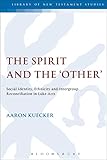The Spirit and the 'Other' : social identity, ethnicity and intergroup reconciliation in Luke-Acts / Aaron Kuecker.
Material type: TextSeries: Library of New Testament studies ; 444. | T & T Clark library of biblical studiesPublication details: London ; New York : T & T Clark International, c2011.Description: xiii, 277 p. ; 24 cmISBN:
TextSeries: Library of New Testament studies ; 444. | T & T Clark library of biblical studiesPublication details: London ; New York : T & T Clark International, c2011.Description: xiii, 277 p. ; 24 cmISBN: - 9780567235701
- 9780567249142
- 226.406 23 KUE
| Item type | Current library | Call number | Status | Barcode | |
|---|---|---|---|---|---|
 Short Loan Books
Short Loan Books
|
Hamu Mukasa Library Closed Access l Short Loan | 226.406 KUE (Browse shelf(Opens below)) | In transit from Hamu Mukasa Library to Bishop Bukenya Library since 13.02.2025 | 140242 |
Browsing Bishop Bukenya Library shelves,Shelving location: Closed Access l Short Loan Close shelf browser (Hides shelf browser)
"A Continuum imprint"--T.p. verso.
Revised version of the author's thesis (Ph. D.)--St. Mary's College, University of St. Andrews, 2008.
Includes bibliographical references (p. [232]-253) and indexes.
The Holy Spirit in Luke-Acts : tracing the history of research -- Social identity and the "other" : a methodological and historical overview -- Expanding the ethnic horizon : the Spirit and allocentric identity in Luke 1-2 -- Critiquing defective identities : Spirit-empowered figures and in-group bias in Luke 3-4 -- Initiating a scandal of universal particularity : the Spirit in Acts 1-2 -- Consummating a new identity : the community summaries and the identity-forming power of a group -- Incorporating the "other" : the Spirit and superordinate identity in Acts 6-9 -- Transcending ethnicity : the Spirit and trans-ethnic identity in Acts 10-15 -- Conclusion.
"Aaron J. Kuecker draws on resources from social identity theory to demonstrate that in Luke's narrative the Spirit is the central figure in the formation of a new social identity. In his argumentation Kuecker provides extended exegetical treatments of Luke 1-4 and Acts 1-15. He shows that Luke 1-4 establishes a foundation for Luke's understanding of the relationship between human identity, the Spirit, and the 'other'--especially as it relates to the distribution of in-group benefits beyond group boundaries. With regard to Acts 1-15, Kuecker shows that the Spirit acts whenever human identity is in question in order to transform communities and individuals via the formation of a new social identity.... This transformed identity produces profound expressions of interethnic reconciliation in Luke-Acts expressed through reformed economic practice, impressive intergroup hospitality, and a reoriented use of ethnic language"--Provided by publisher.
There are no comments on this title.






